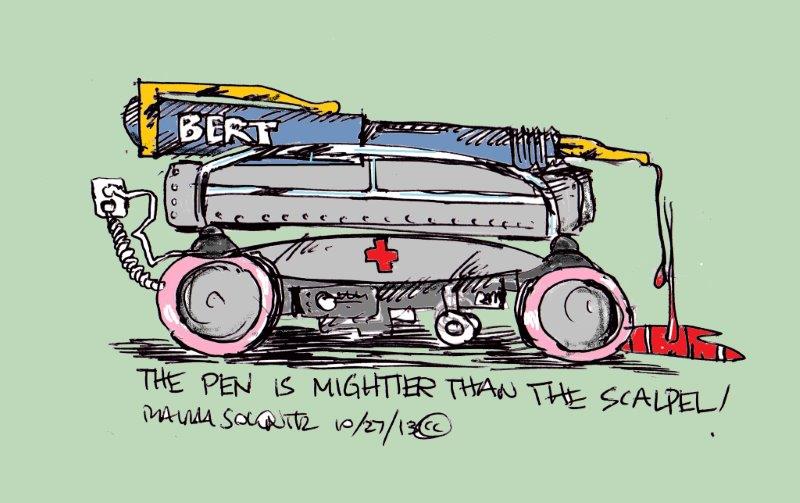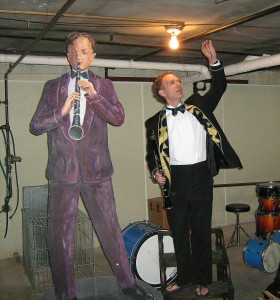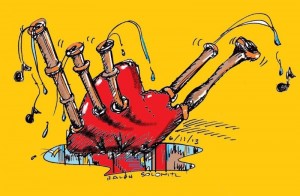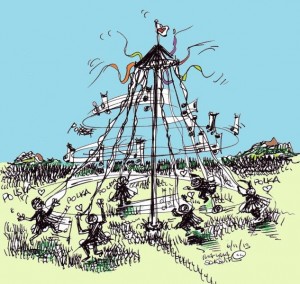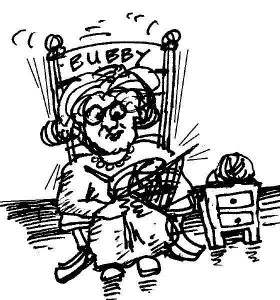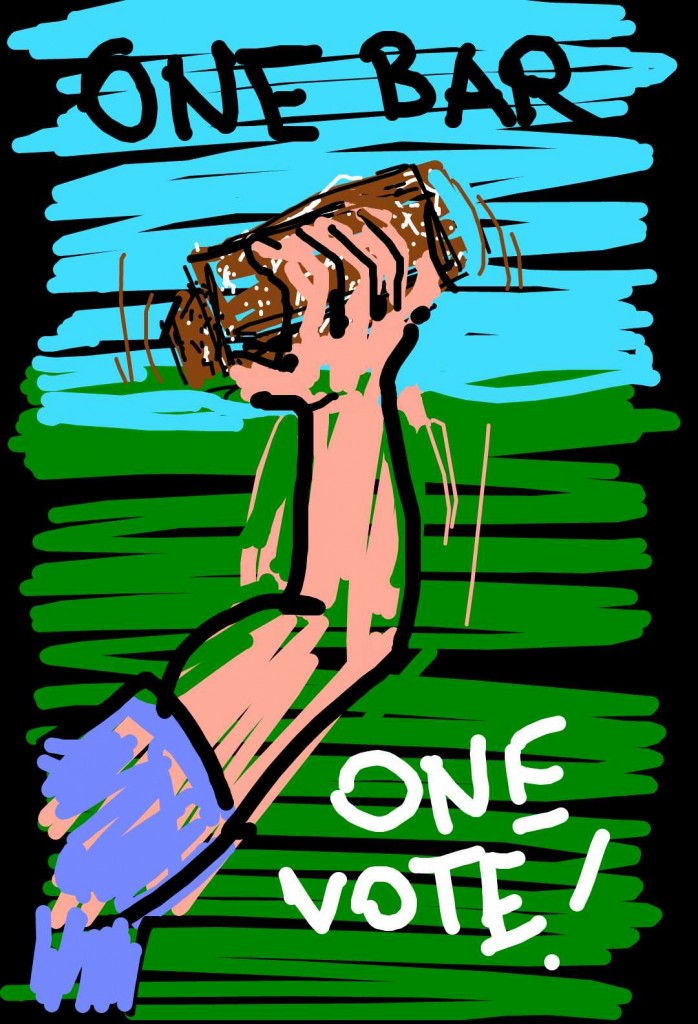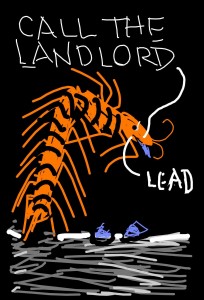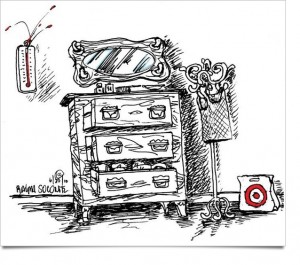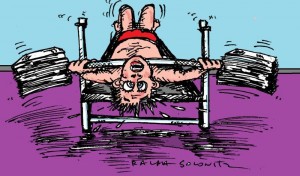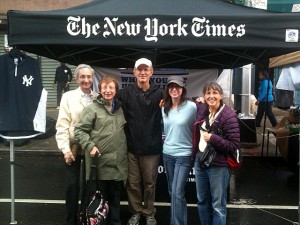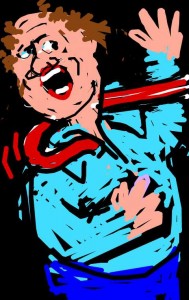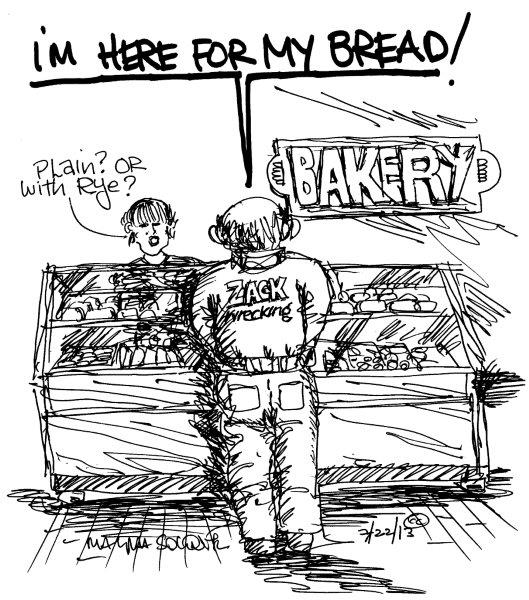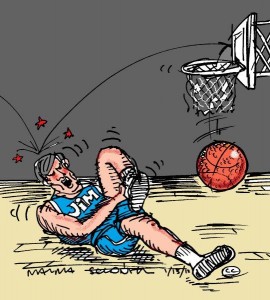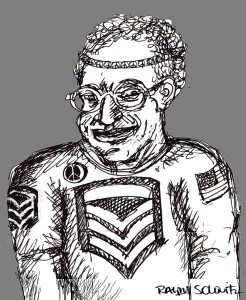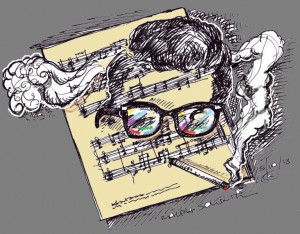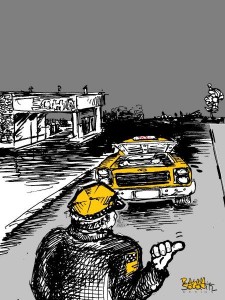FIVE CAPS
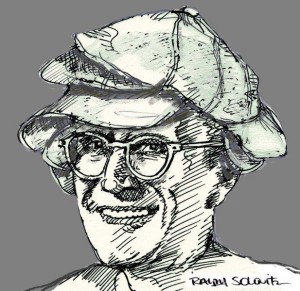
I lost my Brooks running hat. I owned two. I lost them both. I bought them at a running store in Ann Arbor, Michigan.
I don’t usually lose things, except hats. (I’m excellent with gloves.)
I went to Dick’s in Cleveland for a replacement hat and bought an Adidas. It constricted my head. I got minor headaches from the Adidas. (Granted, I didn’t give my head much time to adjust.)
Amazon, I tried that too. Nothing appropriate. I wanted a long-bill white cap with not much writing on it. eBay had four such “old school” Brooks Infiniti running caps — just like my lost caps. (Not like the trashy Brooks hats of today, with a lot of writing.)
Thank you, eBay! I bought all four caps. That’s excessive I know. But only if I die soon. (Yiddishe Cup’s drummer, Don Friedman, has 10 pair of black jeans. Steve Jobs had at least 50 black turtleneck shirts.)
I went back to eBay a couple days later, just to cruise, to see how the world of caps was holding up. There were no “old school” Brooks hats left. I had cornered the market!
My Brooks hats arrived from Mississippi. Then my wife found my lost cap, which was in the kitchen in a basket. Somebody had put it there. Not me.
Now I have five “old school” Brooks Infiniti caps. Even better.
—
Check out Klezmerpalooza here. Yiddishe Cup plays Sat. Nov. 16 evening, Cleveland.
November 6, 2013 2 Comments
I’M AS GOOD AS DANNY KAYE
This is a fake profile. The complete fake-profiles series is here.
Danny Kaye watched surgery for a hobby. He hung around doctors and operating rooms.
My parents admired Danny Kaye; he could dance, sing, and do impersonations, plus the medical stuff.
My parents wanted me to be Danny Kaye — the medical part.
Instead, I majored in history and became a journalist. I wrote a 4,000-word article on open-heart surgery. I also did a story on polio. I watched some surgery.
I tried surgery. My patient –- call her Karen — took two years to recover, and I suffered financial and legal complications. I never expected to make money from operating on her but I didn’t think I would go broke, which I did. A lawyer called me a “kidnapper,” as if I had purposefully kept Karen captive for eight hours. (The surgery was only seven hours, schmuck!)
Post-op, I told Karen, “The good news is you’re alive and your aortas — two of them – are 90-percent clear. I used pipe cleaner. The bad news is the other aortas are controversial. Any sudden outburst by you now, and you might die.”
Karen screamed but didn’t die. She sued me.
Danny Kaye hosted Herman’s Hermits on his TV show in 1965, to encourage youngsters to watch. Danny’s older viewers preferred Imogene Coca, Nanette Fabrey and Jim Nabors.
Kaye experimented. He took chances. So did I.
I have mixed feelings about Kaye, to this day. My parents liked him more than me. I performed my operation on Karen so I wouldn’t have to endure more snide remarks from my parents, like “Son, you write for a suburban weekly. That’s not a living.”
Walk in my shoes. The cold rejection of my parents. I took a knife to a young woman’s heart.
I’m good at surgery. I’m not Cleveland Clinic quality but I’m good.
I’m as good as Danny Kaye.
—
Carlo Wolff wrote an in-depth, real profile of Ralph Solonitz, this blog’s illustrator. Click here to read it. (Cleveland Jewish News, 10/25/13.) By the way, the drawing above is a pen atop a gurney.
—
Yiddishe Cup is at KlezmerPalooza at The Temple, Beachwood, Ohio, 7:30 p.m. Sat., Nov. 16. $20, or $15 if you buy by Nov. 9. Call 216-831-3233. Free dessert, beer and wine.
October 30, 2013 3 Comments
THE GOOD, THE BAD
AND THE NUANCED
Stan Herschfield paced his apartment at 3 a.m., waking up the tenants below. I asked Herschfield to ease up, and he said, “What do you want from me? I can’t fly.”
He moved out shortly after that.
About 10 years later, he called. “Stratton, you remember me — Herschfield. I want to move back in.”
“Herschfield!” I said, emoting like I was in a bad JCC play. “You painted the floor. You complained about the deaf guy across the hall blasting organ music. You complained about the people below you fornicating. You skipped out on your final month’s rent. It cost me fifty dollars to clean the place. But you did teach me some good Yiddish words.”
“I didn’t skip! Those yentzers below, they drove me out!”
“You painted the kitchen floor.”
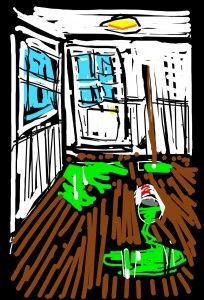 “Stratton, I used Benjamin Moore. Only the best!”
“Stratton, I used Benjamin Moore. Only the best!”
I didn’t let him back.
Maybe Herschfield didn’t say yentzers. Maybe he said shtuppers. I only caught a fraction of his Yiddish. He talked so fast.
I’ve had a couple former tenants move back in. Usually not into the same suite, but often into the same building.
I save old records on tenants. F. Scott Fitzgerald said bookkeeping is not a sexy subject, but it is moderately interesting. I wish I hadn’t thrown out my dad’s tax returns; they would make fascinating reading now I’m older and into nuance.
I keep dossiers on ex-tenants. Nothing personal, no nude posture photos like those Ivy League colleges did. Just notes on whether the tenant paid his final month’s rent, turned in his keys and didn’t trash the place. If all’s well, I’ll let him back. Could be a decade later.
The good tenants, you don’t remember. You have to look them up.
—
This post was a vid first, 4/5/12. Features Alan Douglass singing “Dear Landlord.”
—
Yiddishe Cup is at KlezmerPalooza at The Temple, Beachwood, Ohio, 7:30 p.m. Sat., Nov. 16. $20, or $15 if you buy by Nov. 9. Call 216-831-3233. Free dessert, beer and wine.
—
A new vid, “You wouldn’t believe the derelicts . . . ” Forty-five seconds of real estate talk:
October 23, 2013 2 Comments
ORIGINS OF THE CHALLAH FAME
This is KlezFiction. The complete KlezFiction series is here.
Why is the Klezmer Hall of Fame — aka The Challah Fame — in Cleveland? Here’s why: Do you remember Bob Malaga, the lawyer who brought the Davis Cup to Cleveland in 1964? Bob Malaga — aka Mr. Tennis — pulled off that Forest Hills-to-Cleveland heist almost single-handedly.
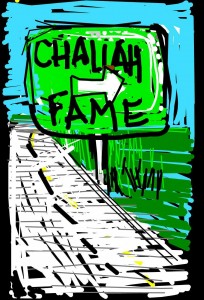 The Challah Fame story is a similar saga, but about another Cleveland monomaniac: Klezmer Guy, aka Mr. Guy.
The Challah Fame story is a similar saga, but about another Cleveland monomaniac: Klezmer Guy, aka Mr. Guy.
Mr. Guy wrote record reviews for his college paper, the Michigan Daily, about Muddy Waters, Buffy Sainte-Marie, Mott the Hoople, and The Up. He also wrote about Buddy Guy (no relation). Mr. Guy had insights. For instance, he disliked Detroit rock and roll because it was simplistic and too loud. Guy lambasted John Lennon’s “Free John Sinclair” concert at the Michigan basketball arena in 1971. Face it, Allen Ginsberg’s harmonium was not music.
John Sinclair and his friends at the White Panther Party were not happy with Guy’s review. Those potheads were fuming. What did they want?
Not the truth.
Guy left Ann Arbor in a hurry, returning to his hometown, Cleveland, to open a nightclub. Cleveland was perfectly situated on the nightclub circuit, halfway between Chicago and New York. Guy booked quality acts into his club, which he operated out of the basement of a shul on Taylor Road. Guy told the temple gadolim (big shots) he was running a Jewish music coffeehouse, and they were ecstatic. The rent was free.
Guy rocked the gatkes (underwear) off the shul — Taylor Road Synagogue (TRS) — which was empty even back then. The shul let Guy use the main sanctuary too. “Use the sanctuary but keep it Jewish!” the TRS president said.
Guy booked the Electric Prunes, Steve Miller and Quicksilver. All Jewish acts, according to Guy. Underground radio DJs bellowed, “Go see Steve Miller tonight at TRS!”
TRS’ sanctuary was packed. So Guy said to himself, “I’m in a shul. I’m making money. Why not go for some authentic Jewish music?” Guy locked onto klezmer. Dave Tarras sold out TRS, as did Mickey Katz.
When the Rock and Roll Hall of Fame opened, Guy rode the Rock Hall’s PR coattails and opened The Challah Fame.
Guy displayed his personal memorabilia: a Corky & Lenny’s T-shirt, Park Synagogue refrigerator magnet and a saxophone reed signed by Hankus Netsky of the Klezmer Conservatory Band — “Love ya! Hankus.” Guy also had a flyer from Lethbridge, Alberta, 1966: Beatnik Coffeehouse Tonight / Tim Hortons / Michael Wex. Guy had violinist Steven Greenman’s fourth grade report card (redacted).
Are you interested in this stuff?
Apparently you are. You’ve read this far.
The Challah Fame keeps irregular hours. Please call ahead.
October 16, 2013 5 Comments
{TODAY I AM A MAN} X 2
My son Jack played his first professional gig with Yiddishe Cup at age 8, when I gave him five dollars to play “Wipe Out.” We were at a temple Chanukah party. Before that gig, he had done pro bono work, sitting in frequently with the band and stealing the show. The senior citizens loved him.
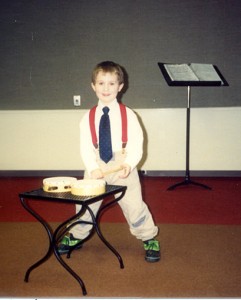
Jack, age 4, 1992, Beachwood library, tambourines and drumsticks.
Years later, Shirley Guralnik, a fan of the band, would ask me, “How’s the little one?” And I would answer, “The little one is in college now and bigger than me.” Shirley died in 2011. She had followed Jack’s career from the beginning.
Jack never got nervous. A case of nerves was hard to develop if, like Groucho Marx, your stage-mom (or dad, in this case) put you on stage practically in diapers.
I told Jack I would pay him $75 — real money — for a real gig after his bar mitzvah. He would be Yiddishe Cup’s drummer for some gigs. He wouldn’t just sit in.
He did great.
Jack got uptight only once. It was at his own bar mitzvah — not the music, reading Torah. The rabbi asked him, “How nervous are you on a scale of 1 to 10.”
“Eight.”
“That’s not bad,” the rabbi said.
Jack said, “I’ve never been an 8 before!”
***
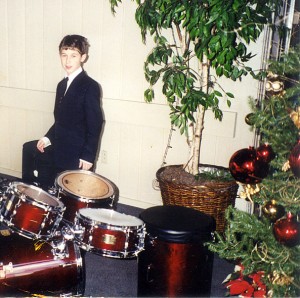
Jack, 13, 2000, at his first "real money" gig
Jack’s $75 gig was at the Barrington Golf Club in Aurora, Ohio. A country club staffer asked if she should light the Christmas tree for the bar mitzvah luncheon. I said, “Not a good idea.”
On the way home, we stopped by my dad’s grave on Aurora Road. I told Jack to place an old clarinet reed on the grave marker.
My point? 1) I didn’t have any old drumsticks. 2) I was at my father’s grave with my youngest kid, who I had just paid to work, just like my father had paid me (to paint walls, argh). The cracked reed fit into the Jewish star on the grave marker.
My son got the $75.
Jack’s band, Vulfpeck, 2013. Jack on keys.
(Today I am a man) X 2 = Age 26, 2013
October 9, 2013 2 Comments
MY DAD HAD A
GOOD SHORT GAME
“Anything within 10 feet of the cup, Toby sank,” said Hy Birnbaum, a friend of my late father.
I saw Hy at the drugstore, where he worked part-time as a pharmacist. He was about 85 at the time. Hy said all his friends were dead. (My dad, Toby, had been dead about 25 years.)
I ran into John Kelly, who worked with my dad 30-some years ago at the key company. John said one of the “big bosses’” had slept overnight in the key-company office because he had marital problems. This big boss, Sid, had a slew of problems. His kids were “real hippies,” said John. Sid was a loud-mouth, know-it-all, country-club Jew from Shaker Heights, I remember my dad saying. Toby liked to kvetch about Sid almost nightly at dinnertime.
My dad disliked most “big bosses.” Who didn’t. One “big boss” my dad tolerated, luckily, was the key company president, Manny Schor, who was a World Federalist, very intelligent and not a show off.
 Manny came to my gigs occasionally in later years. (Most of the big bosses at the key company were Jewish. The company was owned by a Jew.) Manny said, “I can still picture your father sitting at his desk.”
Manny came to my gigs occasionally in later years. (Most of the big bosses at the key company were Jewish. The company was owned by a Jew.) Manny said, “I can still picture your father sitting at his desk.”
So could I.
Why were these old guys still alive and my dad dead? That’s what I wanted to know. My dad’s long game wasn’t so great.
—-
Where are they now:
Toby Stratton 1917 – 1986
Sid 1921 – 2000
Manny Schor 1918 – 2009
John Kelly 1931 – 2011
Hy Birnbaum 1925 –
October 2, 2013 6 Comments
I BRAKE FOR ETHNICITY
1.
Yiddishe Cup has shared the stage with the Hungarian Scouts, Ukrainian Kashtan dancers, and Csardas, a Hungarian troupe. These groups draw fans to local festivals, and the dancers perform in difficult odd meters. Yiddishe Cup doesn’t draw many fans to these multicultural shows. The typical Jew doesn’t want to watch Ukrainians, Poles, or Hungarians dance.
At one festival, some of the folk dances had sappy English titles, like “My Little Cherry Tree” and “I Love You, Shepherd Boy.” I took the printed program home and looked up the real titles:
“Tylko We Lwowie” (Let’s Get Out of Lviv)
“Frogisic Sie Pani” (My Bagpipes are Soggy)
“Jaz Pa Ti” (Dad is Tipsy)
“Pytala Sie Pani” (Pierogis With Butter, Senator)
“Llactosi Nyasa Pilsenioya” (I Hate Milk and Like Beer)
“Jak Szybko Hund Chwile” (Jacko’s Chili Dog Is Outstanding)
“Nasza Jest, Noc Tylko” (Not Tonight, Not Tomorrow.)
2.
I bought a raffle ticket for the St. Mary’s Church (Collinwood) fundraiser, Catholic Order of Foresters, Court #1640.
I bought the ticket from Stan. Stan’s father was Stan too. Stan — my friend Stan – got married at St. William’s Church, not St. Stan’s. (St. Stan’s church is Polish. Stan is Slovenian.)
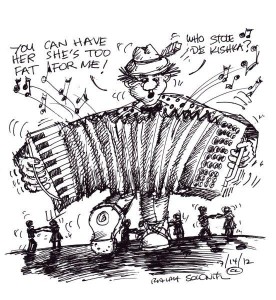 Stan’s wedding reception was at the big Slovenian National Home on St. Clair Avenue at E. 65th Street. Stan hired his uncle’s polka band. At the wedding, we danced Slovenian-style polka — not the same as Polish-style polka. (If you don’t know the difference, please see Harvey Pekar’s “Polka Wars” American Splendor, issue #16.)
Stan’s wedding reception was at the big Slovenian National Home on St. Clair Avenue at E. 65th Street. Stan hired his uncle’s polka band. At the wedding, we danced Slovenian-style polka — not the same as Polish-style polka. (If you don’t know the difference, please see Harvey Pekar’s “Polka Wars” American Splendor, issue #16.)
Yiddishe Cup can play Slovenian! We’ve done Yankovic’s “Just Because” and “Blue Skirt Waltz,” and some charts from polka musician Joey Tomsick.
I won $20 in the St. Mary’s raffle. I haven’t seen the money yet.
Slovenians are tight with a buck. That’s their in-group reputation. Amongst themselves, Slovenians brag about their frugality, and they like to trash Lithuanians, who are even tighter. Stan told me all this.
The St. Mary’s Church raffle was three years ago. Stan, you owe me $23 — that’s $20 plus interest. Pay up, Stan. Any Stan.
September 25, 2013 6 Comments
MOTHER’S ’HOOD
This is a fake profile . The complete fake-profiles series is here.
My mother collects rents. She tracks down delinquent tenants every third of the month. She’s a bit forgetful — she misplaces checks — but she still makes the rounds, chasing tenants. She’s 80 and owns 38 units on the East Side of Cleveland.
She wants me to do the collecting. I don’t want to.
I don’t mean to be disrespectful, but I don’t want to dun 22 year olds for their rent. I prefer to be at work; I’m a lawyer, and have been for 29 years.
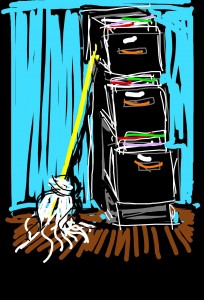 I have manilla folders with notes from my mom. She collects legal clauses like some old ladies collect Hummels. I once tried to streamline her five-page lease but she wouldn’t let me. She instructs her tenants to use a string mop. That’s in the lease! Why? What 22 year old even owns a mop?
I have manilla folders with notes from my mom. She collects legal clauses like some old ladies collect Hummels. I once tried to streamline her five-page lease but she wouldn’t let me. She instructs her tenants to use a string mop. That’s in the lease! Why? What 22 year old even owns a mop?
My mother hides apartment keys everywhere, and says to me, “Now this key is to that room, which is next to this door. Turn right, and reach your hand around the corner and it’s on this ledge.”
I have to write all that down. My sister is in Texas. It’s all on me.
I ran into Bert Stratton, the real estate blogger, the other day. His klezmer band really should hang it up. How long have they been around? Pass the torch (Havdalah candle), Bert! Bert always asks me the same thing: “What are you going to do when your mother dies?”
I don’t want to collect rents and fix leaky toilets, Bert, understand?
Bert says he understands that, but then mentions the real estate gig is, if nothing else, parnassah. Bert likes to sling Yiddish. Sling this, Bert: Va fangool! (Parnassah means livelihood in Yiddish.)
I’ve got a livelihood! I’m 54 with a successful law practice.
Stratton: “Really, what are you going to do when your mother dies?”
“Call you, Bert.”
That shuts him up.
No disrespect to anybody.
—
 For more on the landlord biz, check out my interview on NPR yesterday, from the show The Story. I got my 15 minutes. No, 20 minutes. It’s long, yet amusing.
For more on the landlord biz, check out my interview on NPR yesterday, from the show The Story. I got my 15 minutes. No, 20 minutes. It’s long, yet amusing.
September 18, 2013 5 Comments
FOR NPR LISTENERS ONLY!
Re: my interview on NPR’s The Story today (9/17/13)
Welcome, National Public Radio (The Story) listeners.
I know you’re busy. You have other things to do. Like working out . . .
Guys, give me a minute!
Please enter your email in the space on the RIGHT and click “subscribe.” You’ll get one email a week, every Wednesday morning. Just one email a week. And I won’t sell your email address to anybody.
I’ve written a lot about real estate. Check out the stories here.
I’ve written a lot about music too.
Byliner chose one of my essays as a top non-fiction magazine article of 2012. The essay, The Landlord’s Tale, is the best thing I’ve ever written.
See you here every Wednesday, or else! (Subscribe.)
Here’s a pic of my father:

Toby Stratton, age 50, 1967
September 17, 2013 No Comments
THE BEST ETHNIC / WORLD BAND
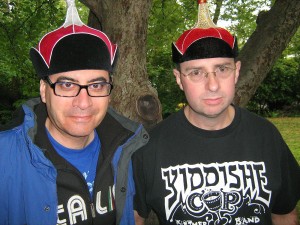
Think ethnic
Yiddishe Cup was nominated for the “best ethnic/world band.” We were practically the only non-Afro/ non-reggae/ non-Caribbean/ non-Zydeco band in the contest.
With one email blast to our fan base, Yiddishe Cup would have won the Cleveland Music Award.
Sorry. Not our scene, Scene. (Cleveland Scene magazine sponsored the contest.) We did not want to email blast our Yiddishe Cup fans. We didn’t want to disturb world Jewry.
I think the judges — Scene editors — designed the ballot so we would win. Their theory: Young voters would spread their votes among the Afro bands, and Yiddishe Cup would pick up the rock-solid Jewish block.
Do you think the other bands held back on email blasts? No! They sent out hundreds of emails: “Vote for us!” . . . “Make us number one!” . . . “We’re number one!”
Pathetic.
The winner was Mifune, an Afrobeat hip-hop band. Mifune — you can’t even pronounce that. At least you can pronounce Yiddishe Cup (if you’re Jewish).
The most-recent music awards contest was in 2010. Nothing since.*
Scene, please reboot. Yiddishe Cup wants to be number one. We’re ready to rock and e-blast now. Free Cleveland coconut bars to everybody who votes for Yiddishe Cup!
*News flash: Scene just held another music awards contest (September 2013). There was no “ethnic/world” category. Foul ball!
—-
The photo at top is Daniel Ducoff (L) and Alan Douglass of Yiddishe Cup. Their hats are Mongolian.
—
SIDE B
CENTIPEDE LANDLORD
I was the landlord in a panel discussion, sponsored by the Cleveland Tenants Organization and the Center for Families and Children
I wore a sports coat and polo shirt. I looked good.
One problem: there was no audience, to speak of (to). Only two people. One had an apartment full of centipedes. She had put her money in escrow for several months, and the landlord hadn’t gotten rid of the centipedes. She said, “I don’t mind a bug or two, but I don’t like them crawling on my ceiling, and me, when I’m sleeping.”
She also said there were grain moths when she moved in. She said the city inspector came out and said, “Where do you shop?” Which she considered a veiled racial remark. “Like he thought I shopped in the ghetto. I shop where everybody else shops!”
The woman’s landlord should have gotten rid of the centipedes. I would have liked to have heard from the landlord.
The other person at the presentation had been booted out of her apartment. Her common-law husband had kicked her out. She had two kids and lived on $400/month.
Mr. Polo Shirt – me — had nothing to say. Come move in with me? Nope.
Lead paint. That’s boring. The meeting ended on that note.
September 11, 2013 6 Comments
PAPES
I feel bad for the Cleveland Plain Dealer. The PD is understaffed and demoralized. But I feel worse for myself. I want my local news, in print, on the breakfast table every morning. (The paper is now home-delivered only four days a week.)
Yes, I’ve heard of the Internet and iPads. I’m not going that way with my papes!
When John Gilligan, an ex-Ohio governor, died, I read about it two days late. That’s not right; I should have gotten that news sooner.
I’m signing up for Pony Express.
The Wall Street Journal stopped coming to my house the same day the Plain Dealer died (August 5). All newspaper home-delivery got screwed up. A neighbor — nine houses away — still received the Wall Street Journal. I took hers. She didn’t need it! (She has a different delivery guy, apparently.)
My cousin George, a big sports fan, is in a newspaper funk too, because he can’t read the Plain Dealer sports pages daily with his morning coffee.
Everybody over 50, please repeat with me: “Screw Newhouse!” (Newhouse owns the PD.)
My son Ted delivered the Sun Press, a weekly. I was his sub. My dad delivered the Cleveland News. My grandfather delivered the Vilna Bugle (Shofar), maybe. My dad wouldn’t allow me to be a paperboy. He wanted me to enjoy life more than he did.
I enjoy papes. Where are my papes?
—
SIDE B
This is a fake profile. The complete fake-profiles series is here.
WHATEVER IT TAKES
I’ve played Perchik and Tevye in Fiddler on the Roof.
Sometimes I get calls from small-town theater troupes to discuss Jewish stuff, like Fiddler. They ask about yarmulkes and the breaking of the glass, and chair lifting.
I make up stuff. I’ve been to enough Jewish weddings to know the rabbis make up stuff too — particularly about the glass breaking. There are many reasons why the glass is broken. All bobe mayses (old wives’ tales).
When I’m not acting, I do a one-man variety show. I play a little guitar, hand drum, even harmonica, and I sing. I know some Yiddish. I use backing tracks.
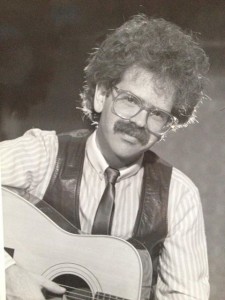 Here’s a promo pic from my glory days. I use it sparingly, now that I’m 59 . . . . . . . . . . . . .
Here’s a promo pic from my glory days. I use it sparingly, now that I’m 59 . . . . . . . . . . . . .
I should advertise in the back of Hadassah mag like Ruth Kaye and Caryn Bark. Who are they?
Who am I? I hear you. I live in Jersey and play the nursing home circuit in the tri-state region. And I work Florida in the winters.
I’ve played Tevye three times. I’ve also played the lead in Jesus Christ Superstar at summer stock in Ohio.
Whatever it takes.
L’shanah tova. (Happy New Year.)
September 4, 2013 2 Comments
NEVER ON FRIDAY AFTERNOON
I had two hot water tanks go out in the same building on the same day, a Friday afternoon.
Four guys can carry in a 92-gallon commercial hot water tank . And I can pay $5,400 for their fun.
No plumbers were around. They were all preparing their boats for Lake Erie weekend-cruising.
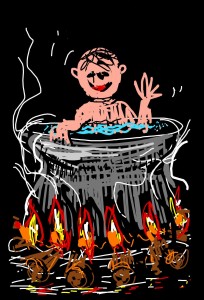 I reached Stack Heating. Stack said he didn’t do commercial hot-water tanks. Just boilers. I reached Royal Flush. They said they couldn’t get it until Tuesday. Dale at Madison Plumbing could do it Monday. Pompeii said never. B & B Hot Water Tank said no thanks.
I reached Stack Heating. Stack said he didn’t do commercial hot-water tanks. Just boilers. I reached Royal Flush. They said they couldn’t get it until Tuesday. Dale at Madison Plumbing could do it Monday. Pompeii said never. B & B Hot Water Tank said no thanks.
I started flipping through the Yellow Pages. That is the end of the world.
I braced myself for calls, like “Mr. Landlord, there is no hot water. How am I supposed to go to work without showering? ” . . . “I have to stay at my parents’ house and it’s 60 miles from work . . . ”
It’s not pleasant, these scenes.
I got Bill the plumber. He came by and blow-torched the old tanks to dry them. (The tanks had flooded because a sump pump had failed.) The plumber gave the first tank a 50-50 chance of recovery. The second tank had 40 percent chance, he said. I liked his odds.
The first tank went on after six hours of pampering. We were good.
Still, it was no picnic.
. . . Dear Landlord, I have deducted $275 from my rent payment because I stayed in a hotel for three days due to the lack of hot water.
Didn’t happen!
—
SIDE B
In honor of the mildest summer ever . . .
WICKIN’ COOL
I threw out my dad’s wife-beater T-shirts. About time. My father died 27 years ago. The wife-beaters were balled up in my dresser drawer.
When it’s 90-plus degrees — which it isn’t often this summer — I think “wife-beaters.” I used to wear my dad’s wife-beaters around the house.
My wife bought me a wicking T-shirt with UV protection at Target. Only $11. It was cooler than the wife-beater.
I saved one of my father’s T-shirts for posterity and threw the rest out.
Underwear fashion is generational. My grown sons aren’t interested in my wife-beaters. My dad wore his wife-beaters under dress shirts for work, for his day job at the key company.
I’m going to buy a couple more ultra-light wicking T-shirts.
No doubt, my sons will pitch my ultra-lights when I’m either dead or not looking. By 2025, T-shirts will be spray-on from a can.
Meanwhile, I’m wickin’ cool.
—
A version of “Wickin’ Cool” was on CoolCleveland.com 7/12/12.
August 28, 2013 2 Comments
FOR NY TIMES READERS ONLY!
Re: my op-ed in today’s NYT (8/17/13)
Welcome, New York Times readers.
I know you’re busy. You have other things to do. Like working out . . .
Guys, give me a New York minute!
Please enter your email in the space on the LEFT and click “submit.” (TMI: Scroll down on the LEFT to a pink button that says “Yiddishe Cup Home.” You’ll see “join the mailing list” there.) You’ll get one email a week, every Wednesday morning. Just one email a week. And I won’t sell your email address to anybody.
I’ve written a lot about real estate. Check out the stories here.
I’ve written a lot about music too.
Byliner chose one of my essays as a top non-fiction magazine article of 2012.
I’ve been in the Times op-ed section four times lately. Who else can say that? (Friedman, Brooks, Dowd. They don’t count! They’re not freelancers.)
Subscribe to this blog.
At minimum, buy this album from my son the musician! (I’m a stage dad, today only.) My son has 100,000-plus hits on some of his YouTube videos. His pic was recently in Rolling Stone.
My op-ed today is a lot about family, so you might be interested — you still reading this? — to learn more:
My son Jack’s band, Vulfpeck, will be in New York on October 4.
My son the lawyer, Ted, is a two-time Jeopardy! champion. The Times left that out! Ted is a top-notch lawyer. Ted, sue somebody for me.
Yes, I’m a proud dad.
My daughter, Lucy, and her husband,Tim, didn’t make the op-ed. (Lucy said, “Thank goodness.”) Here’s an equal opportunity addendum: Tim is a first-grade teacher, and Lucy is a corporate event planner in Chicago. Check out Lucy’s event at the White House.
Shabbat shalom ( for those who celebrate).
See you here every Wednesday, or else!
P.S. I bought the paper — the Times. The whole freaking Times. That’s why I’m in it so much. Bezos and me, we’re partying right now.
August 16, 2013 11 Comments
BAD GIG
I didn’t feel like playing the old Jewish standards, such as “Bay Mir Bistu Sheyn” and “Tumbalalaika.” Instead I read neo-beatnik prose from my blog.
Bad move.
I was performing at a nursing home. A resident in the front row said, “Play something we know!” and walked out.
My accompanist — keyboardist Alan Douglass — told me to change my act. He said, “The Who went to their greatest hits whenever they faltered.”
I stuck with the blog stuff. I wanted to be like Dylan at Newport — my own man.
Again, bad move.
Afterward, I told my wife, ‘I feel like I just played Sowinski Playground.” (Sowinski was a city playground where vicious rapes occurred in the 1960s.)
I’ve learned my lesson: My Ferlinghetti schtick isn’t going to cut it at Myers Apartments independent living. Next time I’ll play “Bay Mir Bistu Sheyn” and “Tumbalalaika.”
—
SIDE B
ROBERT WOODWARD
Robert Woodward, who died in June, was a newspaperman, but not the Bob Woodward of Watergate fame.
Robert Woodward worked as a clerk at the Cleveland Plain Dealer. He was a tenant of mine.
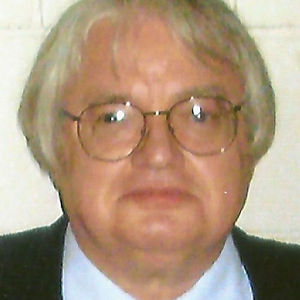
Bob Woodward
He signed his lease renewals in green ink. I always made it a point to countersign in green. Sometimes I had to go out of my way to find a green pen. This went on for decades!
I’m not sure what Bob did at the PD. I occasionally saw him at the movies. He was a film buff. Once we coincidentally flew on the same flight to New York. He was going to see movies.
Woodward was a tenant for 37 years. He died at 65. He had been dead in his suite for about four days. A sister called. The cops went in.
Bob never bugged me, except for appliances. He never wanted people fixing stuff in his apartment.
—
This is not Bob’s life story! For instance, not covered here: Bob wrote op-eds about gay rights for the Plain Dealer and Wall Street Journal .
August 14, 2013 1 Comment
ZACK THE WRECKER
Zack put down a security deposit for the apartment, then changed his mind.
He was going back with his wife. Try some counseling. Not moving in.
The apartment was off the market for a week! I kept the deposit. Zack said I was a thief. I re-read him the application: “If the applicant is approved and makes a deposit –- and then decides not to move into the apartment –- the deposit will be forfeited. THE DEPOSIT WILL NOT BE RETURNED TO THE APPLICANT.”
Zack said, “See you in small claims court!” Then he added, “Wait. I’m taking the apartment! We’re going to have a real good relationship. Tell your building manager, I’ll see him on Sunday with coffee and donuts!”
Zack worked demo and was a hauler. He might rent the apartment just to trash it — to demo it.
Zack didn’t show up Sunday. He called a week later. He still wanted in. He said he would be there in two days. I figured there was a 10 percent chance he would show.
What if he did?
I called Zack back: “I want to part ways. You go yours, I go mine. I’ll give you your security deposit back.”
“Man, I already have my truck packed!”
“I think there’s a lot of ill-will, and we should part ways. I’ll mail you the deposit.”
He said he wanted the deposit right now. “Things are all awkward between my girlfriend and me. I need the money,” he said.
“You can pick up the check from Rachel. She has bangs and is in her twenties,” I said. Rachel worked at the corner bakery. I didn’t want to tangle with Zack.
A basic rule of landlording: Once you get ’em [troublemakers] in, it’s hard to get ’em out.
Maybe I played it too safe. I’ll never know.
—
The latest from Jack Stratton and his band Vulfpeck:
August 7, 2013 4 Comments
BE WELL
My friend Jimmy plays basketball at age 55. But he’s hurting. Jimmy has plantar fasciitis and is temporarily out of action.
I’m glad Jimmy is hurt. Some guys think they’re going to be pain-free forever. It’s fun — sick fun — to watch them get zapped by the middle-age hand buzzer.
I ran into a guy who was on Penn”s all-star lacrosse team. In 1955. He’s 80. He said, “You have to know when to quit, but it’s impossible to know. I never know.” He has stopped playing lacrosse, squash, basketball and singles tennis. His advice: “Take up painting.”
I said, “I already do things like that.” (I play klezmer music.)
Jimmy — my b-ball friend — wants to play basketball at 70. Jimmy’s “painting” is cooking. He makes an excellent roasted lamb.
Every decade or so, I throw out my elbow braces, thumb splints and knee braces. Sometimes I get so emotionally attached to the stuff, it’s hard to throw out. Like, if you sleep with a molded arm splint for three months, you can’t just pitch it.
I recently threw out my “Clarinet Tendinitis 1991” folder containing exercise diagrams.
I did biofeedback back then. I did it just once. I went to a blind masseuse who believed in inducing terrific pain. His dog should have stopped him. Deep tissue / deep purple. He was eventually accused of rape. (Different customer.)
I have a new bag of orthotics — mostly knee braces.
I’m supposed to balance on one foot for 30 seconds with my eyes closed.
Try it. If you succeed, you are well. If you don’t, you’re still OK; you’re “worried well.”
You’re well. Be well.
July 31, 2013 No Comments
CHECK OUT MY LIFESTYLE
This is a fake profile.
I spit whenever and wherever I want.
I search the city dump for old toilet seats and crumpled milk cartons. I use them for collages. I reject traditional beauty.
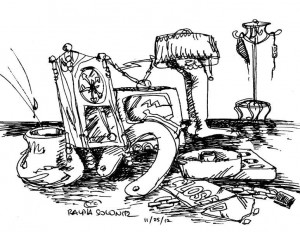
I love TV.
I have very sexy legs.
I have a big house. I need another one. I’m going to see a real estate agent on Friday.
I can’t read in the car. That’s my major weakness: motion sickness.
I want to be Mr. Rogers, but not from Pittsburgh. I’m tender and vivid, kids tell me.
My fields of expertise? A few . . .
Rock and roll trivia, Oriental rugs and baking. I talk mostly about baking, because everyone thinks that’s great; everyone likes cake.
I wear a Speedo bathing suit around the house in the summer. I hate air conditioning.
I trigger crises.
I love movies — all kinds: avant-garde, Jewish, Gay/Lesbian. My favorite movie is The Awning Fabricator. It’s Serbian.
Exercise sucks.
I’ve had ink ooze from my pens into my pants.
My girlfriend, Kiki, is sumptuous, intense, curvaceous and grotesque. She is also a fugitive, mostly from my wife.
Let’s meet for lunch. I’m in Aspen today. I would love to see you.
Check out my lifestyle.
—
Footnote: Four percent of the above verbiage is stolen from the Poetry Project Newsletter.
—
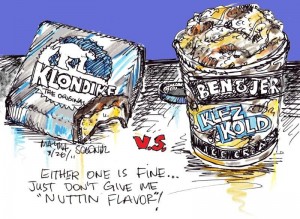
Forecast: Klondikes at Wiley
Be at Wiley tomorrow night (7:30 p.m. Thurs., July 25). See Yiddishe Cup.
Wiley Middle School is at 2181 Miramar Blvd., University Hts., Ohio. Free music, free ice cream. Indoors if raining.
July 24, 2013 5 Comments
ATTEN-HUT!
I wish I had been in the military. I could have been in but I didn’t go in when I could have. I was against Vietnam. I learned quagmire — the word — from Walter Lippmann in Newsweek. ‘Nam was a quagmire, Lippmann wrote.
I think I can take orders, and I don’t generally sass people, and I’ve never argued with cops or umpires.
Some of my high school classmates went into the service. Some are on the war memorial on Green Road. By and large, these guys weren’t in the college-prep classes.
One high school friend went to Annapolis, though. He eventually became acting head of the FBI in Cleveland. I visited him in his office overlooking Lake Erie, and we brainstormed on ways to thwart terrorists. I didn’t have much to contribute.
When I was about 10, I sent away to the Air Force Academy for photos, and the academy mailed me an application. That was exciting.
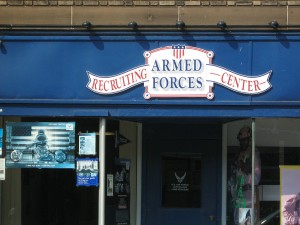 I was mistaken for a military man just once, when I represented the Armed Forces at a sign-review meeting at city hall. The Armed Forces rented stores from my family. A sign-review board member said, “You walk like a military man.”
I was mistaken for a military man just once, when I represented the Armed Forces at a sign-review meeting at city hall. The Armed Forces rented stores from my family. A sign-review board member said, “You walk like a military man.”
Aten-hut! Thank you.
The Armed Forces recruiting center contained the four major branches: Army, Navy, Marine and Air Force. The Army turned its basement area into a gym with punching bags and a Nautilus.
In 2008 the recruiters moved out; they went across the street to a newer building, and left us with three ratty sofas, a rusty Nautilus, barbells, a mini-trampoline, and a punching bag. And that wasn’t the half of it.
I wrote to the Army Corps of Engineers, Louisville, Kentucky, re U.S. lease W912QRM504000025:
There is 40 years’ worth of junk in the basement: 27 chairs, a punching bag, American flag, scrap shelving, metal framing, boxes of Army of One promotional material, two bikes, six pieces of Nautilus-like weight equipment, barbells, a mini-trampoline . . .
A 1970s stereo system, file cabinet, and a lot of assorted paperwork, of which I’ve enclosed an invoice from 1991, just to give you a flavor for what’s down there.
The government paid for the hauling. That was my last dealing with the military. “Sgt. Stratton” never happened. Nor did “Private Stratton.” I feel a little guilty about that. (I know, typical ex-hippie revisionist thinking.)
—
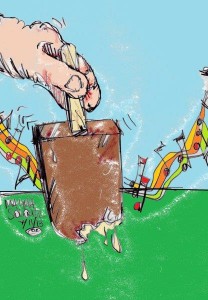 Yiddishe Cup and ice cream drip on the lawn at Wiley Middle School, 2181 Miramar Blvd., University Hts., Ohio, 7:30 p.m. Thurs., July 25. Free concert and free ice cream. Indoors if raining.
Yiddishe Cup and ice cream drip on the lawn at Wiley Middle School, 2181 Miramar Blvd., University Hts., Ohio, 7:30 p.m. Thurs., July 25. Free concert and free ice cream. Indoors if raining.
—-
Clevelanders, go to “Hava Nagila (The Movie)” 7:30 p.m. tonight (July 17) at the art museum, Gartner Aud. You won’t regret it. Terrific archival footage. You don’t need to be Jewish or a klezmer nut to enjoy it. Helps, but not essential. Features Harry Belafonte.
July 17, 2013 1 Comment
THE BUDDY HOLLY
KLEZMER BAND
This is KlezFiction . . .
I dream about klezmer music and Buddy Holly. I want to be Buddy Holly, but I have to settle for Klezmer Guy.
Animal voices — the sound of cats and fleas. Significant to my music? I need to find out.
There are no rules for good music, only examples of it.
Yiddishe Cup’s Meshugeneh Mambo is a terrific record. Klezperanto –- another good choice. (By the group Klezperanto.)
The wrong song in the wrong place can be the right song.
Hope You Like Klezmer, a coffee table book, has more than 100 color photos of klezmer musicians. Some tied up, some with instruments in odd places. I’m in a bathtub with reeds, like Moses.
Half-ended melodies are fun.
I’m here. Hineni. Take it or leave it.
Please, don’t go!
Fine, go.
I want to play medium-sized halls — 1,500-seat venues — this summer with my band: the Buddy Holly Klezmer Band.
—
Check out “Renting the American Dream” in the latest City Journal. It’s not fiction. Read the comments too.
—
Yiddishe Cup plays Wiley Middle Scho0ol lawn, University Heights, Ohio, 7:30 p.m. Thurs. July 25. Indoors if raining. Free ice cream.
Here’s a vid from the 2009 Wiley show:
July 10, 2013 3 Comments
A GOOD ENOUGH PARENT
Whatever happened to Sylvia Rimm? She dispensed child rearing advice on public radio and in the newspapers.
She advised my wife, Alice, and me to subsume our individuality; create a united front to raise our kids. We did that for a few days.
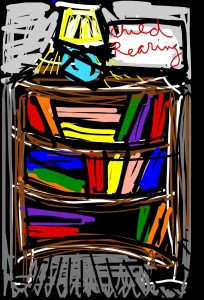 Alice often quoted Sylvia Rimm — whenever Alice wasn’t quoting Freud, Spock, Leach or Brazelton. Alice wanted our kids to gain a “sense of mastery” — skills, basically. For instance, a trip to Disney World was garbage, according to Alice, because the kids wouldn’t learn anything.
Alice often quoted Sylvia Rimm — whenever Alice wasn’t quoting Freud, Spock, Leach or Brazelton. Alice wanted our kids to gain a “sense of mastery” — skills, basically. For instance, a trip to Disney World was garbage, according to Alice, because the kids wouldn’t learn anything.
Alice was overruled; we went to Disney World anyhow. The kids loved Figment, a Disney character, and went ape for Miss Piggy. And don’t forget the Ninja Turtles. At Epcot the kids spent time on the floor at the Moroccan restaurant, wrestling.
Good times. Let ’em roll.
Our children took many lessons — ping pong, gymnastics, Hebrew, accordion. We didn’t allow much TV — mostly Mr. Rogers and The Simpsons. (When our kids grew up and moved out, they watched every show from the past 40 years.)
I liked Bettelheim’s book A Good Enough Parent. I liked the title.
My then-teenage son took my car to the SAT exam. I needed the car because my band equipment was in the trunk, and I had a gig! I took my wife’s car to the SAT testing site and swore loudly at my son in the parking lot. An adult, overhearing me, said, “Hey, ease up!”
Was I out of line? Ask Bettelheim, the expert.
Where is Sylvia Rimm? Also, where is Eleanor Weisberger –- another Cleveland child therapist. I think she’s dead. [Wrong. She’s 93.] What about child expert Susan Glaser? [She’s around.] Does every Jewish woman in Cleveland dispense child rearing advice?
I just Googled “Sylvia Rimm” . . .
Dr. Rimm is a psychologist, director of Family Achievement Clinic in Cleveland, Ohio . . . Dr. Rimm draws experience and inspiration from her wonderful husband; her very successful children: 2 daughters and 2 sons, and their spouses; and 9 vivacious grandchildren.
Rimm shot: her very successful children.
We want Bettelheim! Bruno lied, beat up kids, and had a foul temper. He made the rest of us look good!
—
I wrote “Taxi Driver.” Check the story out, from today’s CoolCleve.
July 3, 2013 4 Comments

